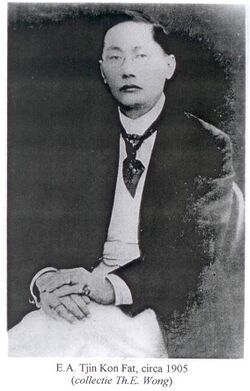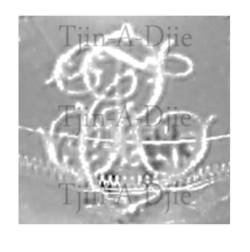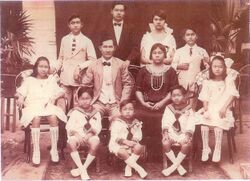Social:Tjin-A-Djie family
Template:Infobox given name The Tjin-A-Djie family (pronounced: Chin-Aaa-Jee; popularity: rare/unique) is a prominent gentry family from the country of Suriname with origins from China , France and Vietnam. They are one of the earliest Chinese families arriving in Suriname in the 1800s. The family is known for their significant, national successes ranging from trade to sports, which thrived throughout the latter part of Suriname's history to the present day. Their success in Suriname began in the late Victorian era with the development into the agriculture sector with plantations. From this, the family expanded into other segments of industry and committees. Throughout history, members of the Tjin-A-Djie family have committed to developing various sectors of society involving baked goods and groceries, the Chinese association, import and export development, educational facilities, religious enterprises, politics, sports, and business.[1] Today, the Tjin-A-Djie family continues to be a part of the Suriname Tennis Association, sponsoring the annual Opa Leo Tjin-A-Djie Tennis Tournament.[2]
Branches of the family today can be found predominantly in Suriname, with members residing in North America and Europe, such as in the Netherlands. Certain 21st century descendants can claim notoriety in their numerous ethnically diverse make-ups; some as high as twelve different ethnicities including: Chinese, French, Vietnamese, Malaysian, Portuguese, Scottish, Dutch, German, Canadian, Surinamese, Native South American, and African.
Their ancestor's full name was Tjin-A-Djie, but according to the habits of the Chinese people, the root and base surname is Tjin. This is what makes this surname so unique to this family.
History
Joseph Tjin-A-Djie (1835-1903)
Upon a family reunification program,[3] Joseph Tjin-A-Djie (born 1835-1903) moved from Kwangtung (Guangong) China to Suriname on the ship the Whirlwind where he arrived in Suriname in 1866.[1] After settling in, he began the development of a plantation that grew rice and various vegetables. On March 15, 1876 Joseph obtained a license to begin opening grocery stores on a plantation in Mon Trésor.[1]
He married a Chinese woman[3] and he fathered two boys named Eduard (Kon-Fat) (1871-1930), and Rudolf (A-Djie) (1880-1962) who flourished as two of the most prominent gentlemen of Suriname. Through his sons, Joseph has been able to further establish a national business family throughout the country. Joseph died in 1903.[1]
Eduard Alphons Tjin-Kon-Fat (1871-1930)
Eduard Alphons Tjin-Kon-Fat | |
|---|---|
 Eduard Alphons Tjin-Kon-Fat Circa 1905 (Collection: Th. E. Wong) |
A man of gentle birth, Tjin-Kon-Fat (pronounced: Chin-Kon-Fat) was a business man, trader, and tycoon growing his extensive wealth through various proprietorships, retail, and trade systems. He married Louise Nielo, the daughter of a wealthy well known business family. Together they started their business, known as Tjin-Kon-Fat - Nielo & Co. After a fire in 1899 destroyed their business on Waterkant, he, and especially his wife, lost everything. Fortunately, they could start over again, using the Nielo family store on Saramaccastraat. In later years he left his wife and her family in bankruptcy. He predominantly was a plantation owner taking charge of at least three plantations in Oldenburg, Nieuw Meerzorg, and Monsort. His plantations grew assortments of rice, vegetables, coffee and coco.[1] In the town of Oldenburg, his own rice/peeling factories/mills processed the raw materials into retail goods in which he sold in the supermarkets that he owned throughout the towns of Oldenburg, Nieuw Meerzorg, Waterkant, Poeloepantje, and Paramaribo.[1] In his stores, he sold an assortment of hard and soft good items such as furniture and appliances, clothing, thread, needles, fabric, perfume, powder, cosmetics, cognac and wine, food and groceries, stationary, and cigars, etc.[1] He furthermore had a "Lucifer Match" Factory [Dutch: luciferfabriek] named “Vulcan” and a coffee restaurant named “Halikibe” (Vreugde), a rental property [Dutch: leenhuis], and a hardware store. Along with his store enterprise, in Waterkant Tjin-Kon-Fat had an import and export company importing products from Hong Kong, the United States, the Netherlands, England, France, and China.[1] As well as an automobile renting establishment and a money loan company.[1]
In addition to his business activities, Tjin-Kon-Fat played an active role helping to develop communities. He was a board member for education and a board member for Suriname’s sports. Also he was a board member for radio stations,[1] president of the Chinese association Moe Poen Sah, executive board member of the Green Cross, and was an alternate member of the Board of Appeal for the [Dutch: Huurwaardebelasting] (translates to rental value tax).[4]
Legacy
Tjin-A-Djie | |
|---|---|
| (Family Crest) | |
 The Family Crest of the Tjin-A-Djie Family of Suriname. It depicts a "R" and a "T" indicating Rudolf J. Tjin-A-Djie. (Watermarked) |
Eduard Tjin-Kon-Fat married and had a number of children. At least 4 are known.
- H. Tjin-Kon-Fat (female) was the chairman of the Catholic Suriname soccer team,[1] and treasurer for “Boys” tennis club.
- J. Tjin-Kon-Fat (female) took part in collecting for the church.[1]
- Estelle Tjin-Kon-Fat (female)
- Edy Tjin-Kon-Fat (female) ( -2011). Edy became a very prominent judge and a law professor for Suriname.
By his death in 1930, he had made himself into one of the most prominent entrepreneurs in Suriname.[4]
The descendants of Eduard have surname Tjin-Kon-Fat.
Rudolf J. Tjin-A-Djie (1880-1962)
A prosperous merchant and industrialist, born in the town of Albina, Rudolf met a young black woman . They produced one child, named Joseph (February 19, 1899 – 1988).
Rudolf J. Tjin-A-Djie was a joint proprietor at the gold mines near the frontier between Suriname and French Guiana and often went to French Guiana for shopping purposes where he met his future wife.[3] A French lady, her name was Elisabeth Marie (nicknamed: Majotte) (née: Tong Lee A Tai). She was of Vietnamese descent born in Paris, France in 1883. Born and bred into French society, Elisabeth Marie came from a wealthy Vietnamese family who had established themselves within the French culture.[3] After ending up in French Guiana and meeting Rudolf J. Tjin-A-Djie, they decided to marry[3] on September 15, 1904. Upon her marriage in Suriname, Elisabeth Marie "[she] took not only her élan, her savoir vivre, her French hats and porcelain, but also the French language and introduced all of that into the extended Chinese family system.[3]" Elisabeth had a fascination for fashion, craftsmanship, and artistry. As a result of this, she heavily influenced the creations of the Tjin-A-Djie crest and constructed it into the family's tableware, including the plates, pure silver cutlery, and the pure crystal glassware. Since Elisabeth was influenced by the French culture having being born in Paris, after marriage and moving to Suriname with Rudolf, she also established a millinery shop, creating and selling beautiful hats in Suriname.
Although Rudolf spoke Dutch and Elisabeth spoke French, they communicated Sranan Tongo to each other, the Surinamese language.[3] In his family life, Rudolf was a stern but kind man, often taking his grand kids riding on his horses when they were little. For example, Reginald and his younger twin brother Randolf would take turns sitting in front of him on the horse, enjoying a ride on a warm summer's day. Typically, Reginald would always ride first then Randolf.
Apart from being a proprietor at the gold mines, Rudolf also owned at least one grocery store and as of 1938 was the owner of the Hollandia bakery[5] (At the time one of the largest bakeries in the country). The bakery has been passed down through his son Leonard Ernest Theodoor’s descendants.
Rudolf J. Tjin-A-Djie and Family | |
|---|---|
| (Family Portrait) Suriname, Circa 1923-1925 | |
 Top: Herman, Eduard, Henriette, Leonard Middle: Agnes, Rudolf J., Elisabeth, Angeline Bottom: Arthur, Rudolf P.B., Raymond |
Legacy
Rudolf J. Tjin-A-Djie and Elisabeth Marie had 9 children of high social standing, and moved from Albina, Suriname to Paramaribo, Suriname when the children were little. Enjoying a privileged life, the children later then flourished in the areas of business, sports, education, and politics.
- Eduard Leo Henri (October 15, 1905 – 1933) (Studying to be a doctor when died)
- Henriette Magdalena Antoinette (February 14, 1907 – 1967) (Teacher)
- Herman Rudolf Johan (November 6, 1910 – 1975) (Tennis champion,[6] Vice President of Suriname Sports Committee,[1] Founder of Tennis BOYS,[7] Board member of the Suriname Tennis Association,[7] Owner of lumber mill companies, President/ Head Manager of Suriname K.L.N Airline)
- Leonard Ernest Theodoor (March 29, 1912 – 1999) (Tennis champion,[6] Treasurer of Suriname Sports Committee,[1] Well known golfer,[1] Member and champion of the Curaçao Racing Club,[8] Rice plantation owner,[9] Bakery owner, proprietor)
- Agnes Regina Marie (September 13, 1913 – 2000) (Head of Chinese Association, Board member of the Roman Catholic RK School Board,[10] Teacher, played active role in politics.[1])
- Angeline Fanny Josephine (August 11, 1915- June 18, 1926) (Died from typhus at sea-traveling to study- and was buried in the Gulf of Biscay)
- Arthur Jean Marie (February 11, 1917 – 1979) (President/Head Manager of Suriname Pan American Airline[11] Lumber factory Executive)
- Raymond Octave Maurits (May 18, 1919 – 1988) (Owner of chicken, pig, and vegetable farms, and a store)
- Rudolf Percy Benjamin (October 30, 1920 – 1991) (Owner of two grocery stores)
Tjin-A-Djie and tennis
The Tjin-A-Djie family has made notable contributions to the sports industry of Suriname, specifically with tennis. Apart from business and societal affairs, the family members engaged themselves within the sports culture and from this, three national champions were born. Herman Rudolf Johan and his brother Leonard Ernest Theodoor were national tennis champions between the years 1941-1957, with Herman’s [second] son becoming national champion in 1960.[12]
References
- ↑ 1.00 1.01 1.02 1.03 1.04 1.05 1.06 1.07 1.08 1.09 1.10 1.11 1.12 1.13 1.14 1.15 b p.289, c p.34, d p.289, e p.57&107, f p.57&107&108, g p.107&108, h p.105, i p.108, j p. 64, k p.182, L p.118, m, n p. 179, o p.180, p p.276 Zijlmans G.C. and Enser H.A. (2002). De chinezen in suriname. Barendrecht, Netherlands: Batavia Publishing. Retrieved from http://www.bataviabooks.com/Chinezen.htm ISBN 90 806 479 3 4
- ↑ Suriname Tennis Bond. (2013, April). Opa leo tjin a djie tennistoernooi 15 jaar. Niews Suriname . Retrieved from http://www.nieuws-suriname.nl/opa-leo-tjin-a-djie-tennistoernooi-15-jaar/
- ↑ 3.0 3.1 3.2 3.3 3.4 3.5 3.6 b, c, e, f, g p.4, d, h p.5 Van Der Plas, A. (2000). Protective wraps. In K. Tjin-A-Djie (Ed.), Parenthood in a We-System (15 ed., Vol. 1, pp. 17-39). Retrieved from http://www.beschermjassen.nl/new/artikelen/Protective%20wraps.pdf
- ↑ 4.0 4.1 p.105 Zijlmans G.C. and Enser H.A. (2002).
- ↑ DBNL Literatuur Uit Nederland & Vlaanderen (2011). De gids. almanak voor suriname 1938. De Gids. Almanak voor Suriname 1938. Marcus, Paramaribo 1937, 269. Retrieved from http://www.dbnl.org/tekst/_gid003193801_01/_gid003193801_01_0090.php
- ↑ 6.0 6.1 p.181 Zijlmans G.C. and Enser H.A. (2002).
- ↑ 7.0 7.1 p. 184 Stutgard W., R. (2011). Tennis. Ricky W. Stutgard, the first Surinamese sports encyclopedia (1893-1988). Alberga, Paramaribo, 1990, Retrieved from http://www.dbnl.org/tekst/stut004eers01_01/stut004eers01_01_0235.php
- ↑ Stutgard W., R. (2011). Leonard Tjin-A-Djie. Ricky W. Stutgard, the first Surinamese sports encyclopedia (1893-1988). Alberga, Paramaribo, 1990, Retrieved from http://www.dbnl.org/tekst/stut004eers01_01/stut004eers01_01_0237.php
- ↑ Tropenmuseum. (2001/2002). Plantage wederzorg. Retrieved from http://collectie.tropenmuseum.nl/default.aspx?ccid=P7638
- ↑ p. 113 Zijlmans G.C. and Enser H.A. (2002).
- ↑ p. 64 Zijlmans G.C. and Enser H.A. (2002).
- ↑ b p.188, c, d, e, f, g, h, p.184, i, j, k, L, m, n p.185 Stutgard W., R. (2011). Tennis. Ricky W. Stutgard, the first Surinamese sports encyclopedia (1893-1988). Alberga, Paramaribo, 1990, Retrieved from http://www.dbnl.org/tekst/stut004eers01_01/stut004eers01_01_0235.php
